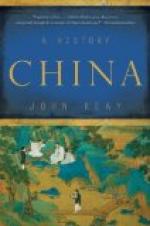One professional class was severely hit by the changed circumstances—the Shang priesthood. The Chou had no priests. As with all the races of the steppes, the head of the family himself performed the religious rites. Beyond this there were only shamans for certain purposes of magic. And very soon Heaven-worship was combined with the family system, the ruler being declared to be the Son of Heaven; the mutual relations within the family were thus extended to the religious relations with the deity. If, however, the god of Heaven is the father of the ruler, the ruler as his son himself offers sacrifice, and so the priest becomes superfluous. Thus the priests became “unemployed”. Some of them changed their profession. They were the only people who could read and write, and as an administrative system was necessary they obtained employment as scribes. Others withdrew to their villages and became village priests. They organized the religious festivals in the village, carried out the ceremonies connected with family events, and even conducted the exorcism of evil spirits with shamanistic dances; they took charge, in short, of everything connected with customary observances and morality. The Chou lords were great respecters of propriety. The Shang culture had, indeed, been a high one with an ancient and highly developed moral system, and the Chou as rough conquerors must have been impressed by the ancient forms and tried to imitate them. In addition, they had in their religion of Heaven a conception of the existence of mutual relations between Heaven and Earth: all that went on in the skies had an influence on earth, and vice versa. Thus, if any ceremony was “wrongly” performed, it had an evil effect on Heaven—there would be no rain, or the cold weather would arrive too soon, or some such misfortune would come. It was therefore of great importance that everything should be done “correctly”. Hence the Chou rulers were glad to call in the old priests as performers of ceremonies and teachers of morality similar to the ancient Indian rulers who needed the Brahmans for the correct performance of all rites. There thus came into existence in the early Chou empire a new social group, later called “scholars”, men who were not regarded as belonging to the lower class represented by the subjugated population but were not included in the nobility; men who were not productively employed but belonged to a sort of independent profession. They became of very great importance in later centuries.




